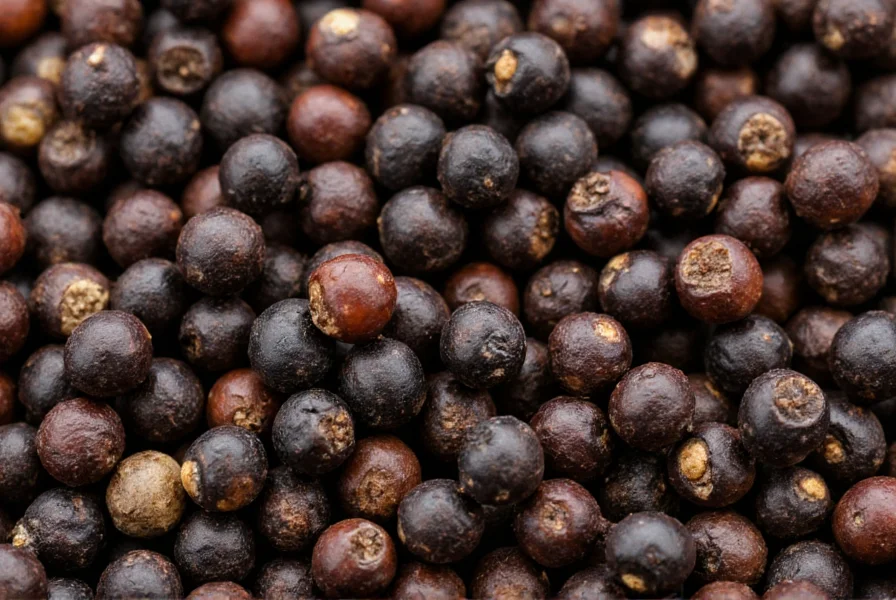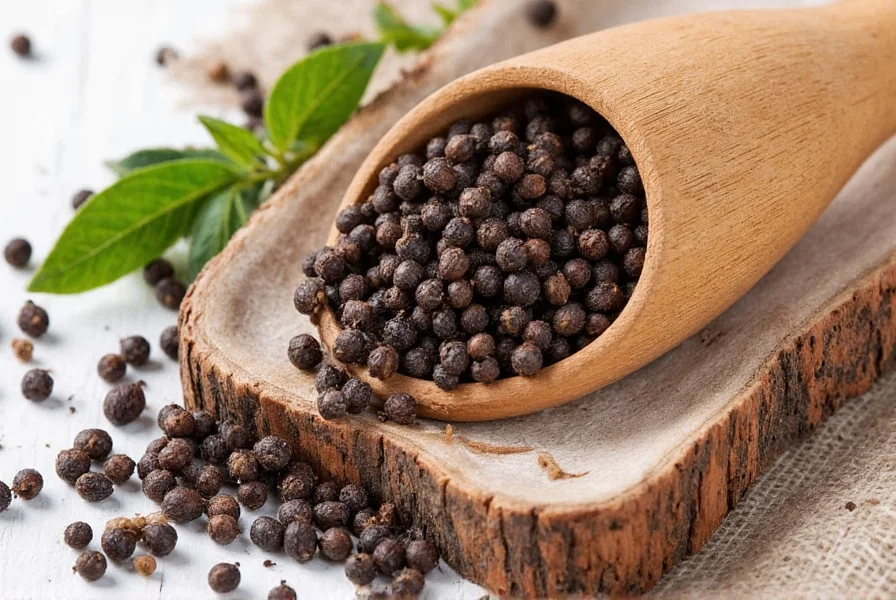For centuries, black pepper has been more than just a kitchen staple. This "king of spices" has played a significant role in traditional medicine systems worldwide, particularly in Ayurveda and Traditional Chinese Medicine. Modern science is now validating many of these historical uses, revealing that black pepper's health-promoting properties extend far beyond its distinctive flavor.
The Science Behind Black Pepper's Power
At the heart of black pepper's health benefits lies piperine, an alkaloid compound responsible for its pungent taste and most therapeutic effects. Piperine constitutes approximately 4-6% of black pepper by weight and has been the subject of extensive scientific research. What makes piperine particularly remarkable is its ability to influence biochemical processes in the human body, especially regarding nutrient metabolism and absorption.
One of piperine's most significant mechanisms is its inhibition of enzymes in the liver and intestines that break down certain compounds. This process, known as first-pass metabolism, normally reduces the bioavailability of many nutrients and medications. By modulating this process, piperine effectively increases the amount of beneficial compounds that enter the bloodstream and reach target tissues.
Evidence-Based Health Benefits of Black Pepper
Enhanced Nutrient Absorption
Black pepper's most scientifically supported benefit is its ability to dramatically improve the bioavailability of various nutrients. Research published in Planta Medica demonstrated that combining curcumin (the active compound in turmeric) with just 20mg of piperine increased curcumin bioavailability by an astonishing 2,000%. This synergistic relationship explains why traditional recipes often combine turmeric and black pepper.
Studies also show black pepper enhances absorption of:
| Nutrient/Compound | Absorption Increase | Research Source |
|---|---|---|
| Curcumin | Up to 2,000% | Planta Medica, 1998 |
| Beta-carotene | 60-70% | Journal of Nutrition, 2007 |
| Selenium | Significant increase | Nutrition Research, 2010 |
| CoQ10 | Approximately 30% | Journal of Functional Foods, 2015 |
Anti-Inflammatory Properties
Chronic inflammation underlies many modern diseases, and black pepper shows promising anti-inflammatory effects. Research in Immunopharmacology and Immunotoxicology indicates that piperine can inhibit inflammatory pathways by reducing the production of pro-inflammatory cytokines. This mechanism suggests potential benefits for conditions like arthritis and other inflammatory disorders, though more human studies are needed to confirm therapeutic applications.
Antioxidant Effects
Black pepper contains several compounds with antioxidant properties that help combat oxidative stress. A study in Food and Chemical Toxicology found that piperine effectively scavenges free radicals and enhances the body's natural antioxidant enzyme systems. These effects may contribute to cellular protection and potentially reduce the risk of chronic diseases associated with oxidative damage.
Digestive Health Support
Traditional medicine has long used black pepper to support digestion, and modern research provides some explanation. Piperine stimulates the production of hydrochloric acid in the stomach, which improves protein digestion and nutrient absorption. It also appears to enhance the activity of digestive enzymes from the pancreas, potentially reducing bloating and discomfort after meals. Research in Journal of Ayurveda and Integrative Medicine supports these digestive benefits.
Other Potential Benefits
Emerging research suggests additional benefits of black pepper consumption, though these require more extensive human studies:
- Brain health: Animal studies indicate piperine may protect against neurodegenerative conditions by reducing oxidative stress in brain tissue
- Metabolic health: Some research suggests piperine may influence fat metabolism and insulin sensitivity
- Respiratory support: Traditional use for respiratory conditions has some preliminary scientific backing

Practical Applications: Maximizing Black Pepper Benefits
To harness black pepper's health benefits effectively, consider these evidence-based recommendations:
Culinary Integration
Adding just 1/4 to 1/2 teaspoon of freshly ground black pepper to meals provides sufficient piperine for enhanced nutrient absorption without overwhelming flavor. The key is consistency—incorporating black pepper regularly into your diet rather than occasional large doses.
Strategic Pairing
Combine black pepper with specific foods to maximize benefits:
- Turmeric/curcumin: Essential pairing for maximum curcumin absorption
- Vegetables rich in fat-soluble vitamins: Enhances absorption of vitamins A, D, E, and K
- Iron-rich plant foods: May improve non-heme iron absorption
Supplement Considerations
When taking supplements known to have low bioavailability (like curcumin, resveratrol, or certain vitamins), adding a small amount of black pepper can significantly increase their effectiveness. Many high-quality supplements now include piperine specifically for this purpose.
Safety and Considerations
Black pepper is generally safe when consumed in culinary amounts. However, certain considerations apply:
Potential Side Effects
Excessive consumption (more than 1-2 teaspoons daily) may cause:
- Digestive discomfort in sensitive individuals
- Mild heartburn or stomach irritation
- Potential interactions with certain medications
Medication Interactions
Because piperine affects drug metabolism, it may interact with:
- Anticoagulants (blood thinners)
- Certain antidepressants
- Some chemotherapy medications
Individuals taking prescription medications should consult their healthcare provider before significantly increasing black pepper intake or taking piperine supplements.
Special Populations
Pregnant and breastfeeding women should stick to culinary amounts rather than high-dose supplementation. Those with gastrointestinal conditions like ulcers or GERD may need to moderate intake.
Conclusion: A Simple Spice with Significant Benefits
Black pepper represents a remarkable example of how traditional culinary wisdom often aligns with modern scientific understanding. Its primary benefit—enhancing nutrient absorption—makes it a valuable addition to any health-conscious diet. While not a miracle cure, incorporating black pepper strategically can significantly improve the nutritional value of your meals and potentially enhance the effectiveness of certain supplements.
The research on black pepper continues to evolve, with scientists exploring additional applications for piperine in therapeutic contexts. For now, the most practical and evidence-supported approach is to enjoy black pepper as part of a varied, whole-food diet—grinding it fresh when possible to maximize piperine content and pairing it thoughtfully with other nutrient-dense foods.
Frequently Asked Questions
How much black pepper should I consume daily for health benefits?
For general health benefits and enhanced nutrient absorption, 1/4 to 1/2 teaspoon of freshly ground black pepper daily is sufficient. This amount provides approximately 20-50mg of piperine, the active compound. Consuming more than 1-2 teaspoons daily may cause digestive discomfort in some individuals. The key is consistent, moderate consumption rather than occasional large doses.
Does the type of black pepper affect its health benefits?
Yes, the variety and freshness significantly impact piperine content. Whole peppercorns retain piperine better than pre-ground pepper, which loses potency rapidly. Malabar and Tellicherry varieties from India typically have higher piperine concentrations (5-9%) compared to other varieties. For maximum benefits, purchase whole peppercorns and grind them fresh just before use, as piperine degrades when exposed to air and light.
Can black pepper help with weight management?
Some preliminary research suggests piperine may support metabolic health by influencing fat metabolism and thermogenesis, but evidence for significant weight loss is limited. A study in Journal of Agricultural and Food Chemistry found piperine might inhibit the formation of new fat cells, but human trials are needed. Black pepper's primary weight management benefit likely comes indirectly through improved nutrient absorption from healthy foods rather than direct fat-burning effects.
Is there a difference between black pepper and white pepper for health benefits?
Yes, black pepper generally offers greater health benefits than white pepper. Black pepper contains the outer layer (pericarp) which white pepper lacks, resulting in higher piperine content (5-9% vs 3-5% in white pepper). The processing of white pepper removes some beneficial compounds. Research in Food Chemistry shows black pepper has significantly higher antioxidant activity. For maximum health benefits, black pepper is preferable to white pepper.
How does black pepper enhance turmeric absorption?
Black pepper enhances turmeric absorption primarily through piperine, which inhibits enzymes in the liver and intestines that break down curcumin (turmeric's active compound). This process, called first-pass metabolism, normally reduces curcumin bioavailability. By slowing this breakdown, piperine allows more curcumin to enter the bloodstream. Research shows this combination can increase curcumin absorption by up to 2,000%, making the pairing essential for maximizing turmeric's health benefits.











 浙公网安备
33010002000092号
浙公网安备
33010002000092号 浙B2-20120091-4
浙B2-20120091-4